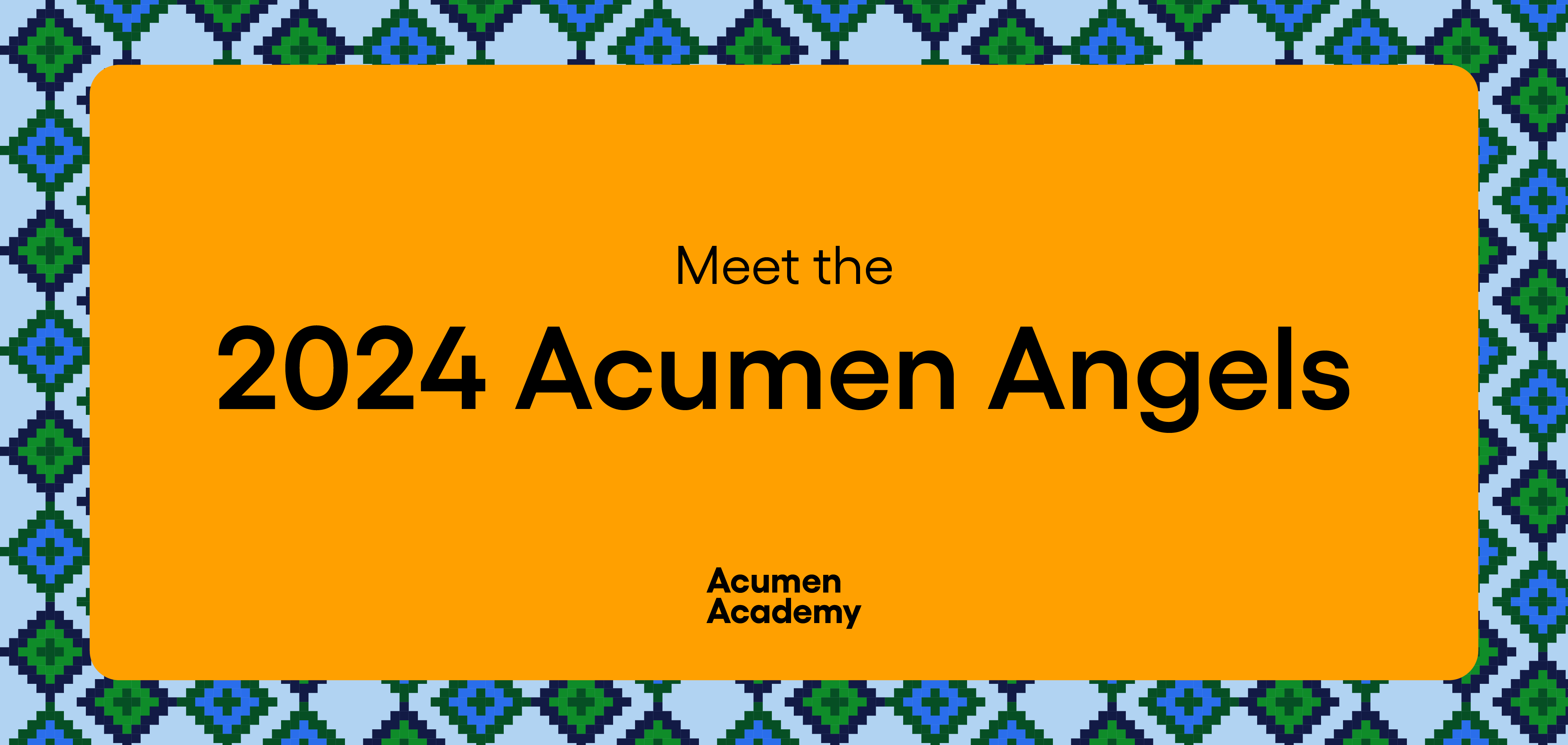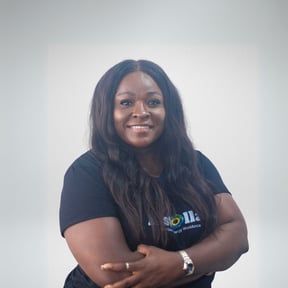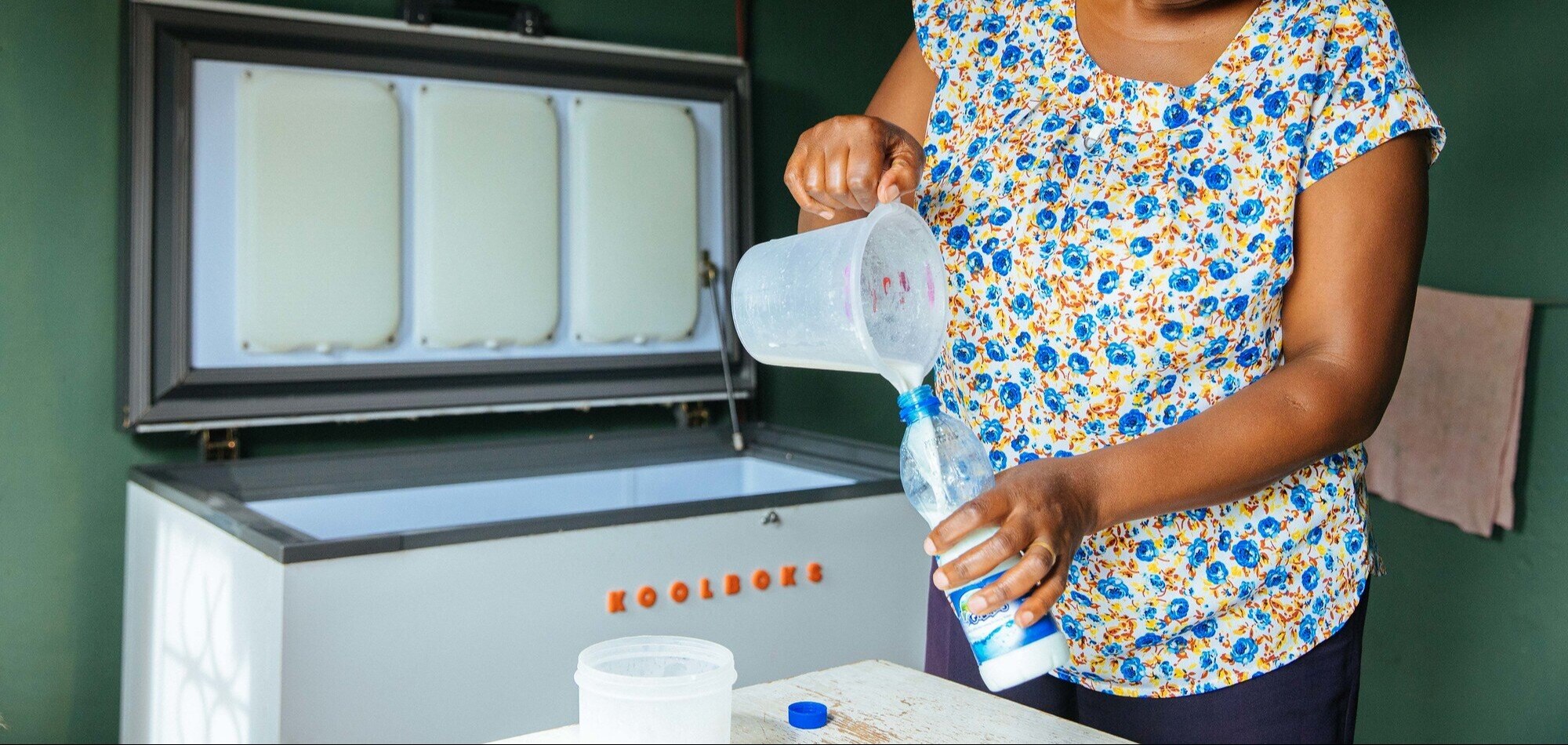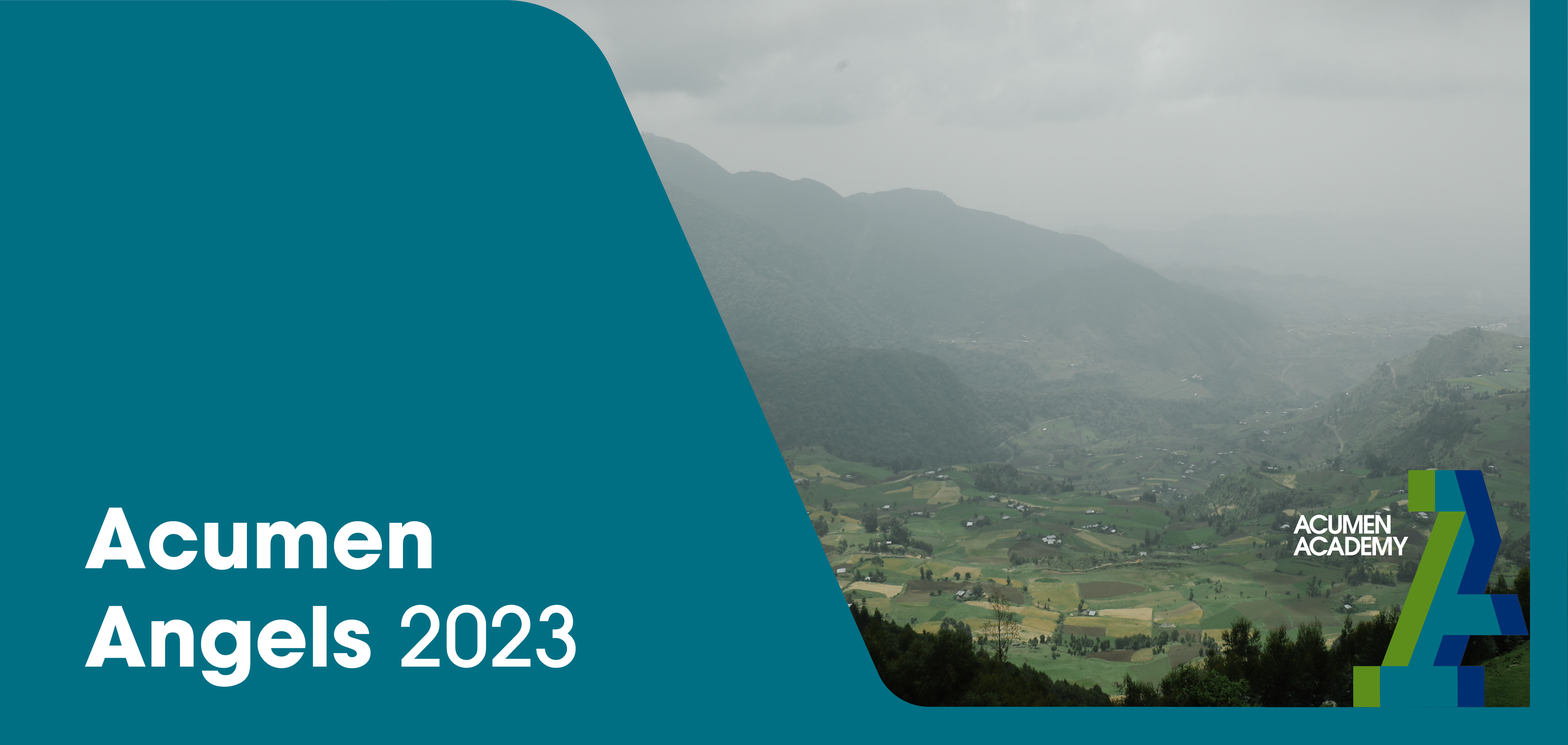Follow us on X, LinkedIn, and Facebook and join the journey as we continue to unpack and tell the inspiring stories of the 2024 Acumen Angels awardees.
Redefine Success
Meet the 2024 Acumen Angels awardees
Our 2024 Acumen Angels awardees are redefining innovation by bringing essential services, economic opportunities, and transformative solutions to historically excluded communities
March 19, 2025
Acumen Angels 2024
Acumen Angels backs entrepreneurs who dare to tackle pressing problems of poverty. Since launching the program in 2018, we've awarded $4.6 million to 99 early-stage entrepreneurs globally. These awardees have gone on to impact more than 23 million lives, create over 87,000 jobs, serve over 780,000 paying customers, and raise over $42 million in follow-on capital.
For more on the strategy behind Acumen Angels and the impact of the program, read here.
From climate-smart agriculture in Ethiopia to maternal health access in Nigeria and renewable energy for refugee communities in Kenya, our 2024 awardees are building scalable, sustainable solutions that put people and communities first.
Agriculture
Ricardo Andres Calderon Solarte
Agrosolidaria Florencia, Ütaí
Colombia

Agrosolidaria promotes sustainable agroforestry and biodiversity conservation while supporting smallholder farmers in the Amazon. They work with 350 rural families and victims of armed conflict, helping them cultivate native species and transform raw materials into value-added products marketed under the Ütaí brand. Their impact extends across 3,600 hectares of protected land.
Use of funds: To invest in marketing, sales, and branding efforts leading to an annual projected growth of 30%.
Adugna Haile
Adugna Haile Farm Plc
Ethiopia

Adugna Haile Farm produces and distributes high-yield, climate-smart seeds to smallholder farmers in Ethiopia. With only 3.5% of Ethiopia's farmland covered by improved seeds, millions of farmers struggle with low productivity and food insecurity. The company provides certified seeds that ensure better yields and higher incomes while training farmers in sustainable practices. They've impacted over 200,000 farmers, including internally displaced persons.
Use of funds: To purchase a seed-cleaning machine and expand into vegetable seed production, such as sweet potato used by more than 500,000 smallholder farmers.
Isaac Odongo
Organic Route
Uganda

Organic Route combats food waste by providing solar-powered dryers and dehydration facilities for smallholder farmers. Their model allows farmers to preserve excess produce, reducing post-harvest losses while increasing income by 25%. The organization provides drying infrastructure, packaging, and access to urban markets to a network of over 300 farmers, ensuring more sustainable food systems.
Use of funds: To upgrade solar dryers into dehydrators, establish a new collection center in Kampala, and expand working capital.
Huong Nguyen Thi Mai
Hachi Vietnam High Technology JSC
Vietnam

Hachi Vietnam provides low-cost, climate-resilient greenhouses for smallholder farmers, helping them increase yields while reducing environmental impact. Their greenhouses, priced 40% lower than market alternatives, are designed to withstand extreme weather conditions. They also offer high-yield crop varieties, fertilizers, and weather prediction tools. To date, they have installed over 2,000 greenhouses, increasing farmer incomes by up to 300%.
Use of funds: To enhance their smart farming app and expand services to 100,000 more farmers, boosting customer acquisition by 40%.
Vincent Lagace
Sirio Soluciones Digitales
Mexico

Sirio Soluciones Digitales digitizes key processes for smallholder farmers through an integrated SaaS platform for certification, payments, and quality control. Many farmers still rely on paper-based systems, leading to inefficiencies and financial losses. Sirio's technology enables farmer organizations to streamline operations and improve transparency, benefiting over 10,000 coffee farmers in Mexico. The company is now expanding into Central America.
Use of funds: To develop a WhatsApp-based feature for smallholder farmers, providing personalized real-time data to improve yields and scale Sirio's subscription service.
Claire Rhodes
Producers Direct
United Kingdom

Producers Direct is a farmer-led cooperative that improves smallholder farmers' incomes through access to better markets, digital tools, and training. Their digital platform, FarmDirect, helps farmers collectively sell produce and negotiate fairer prices. They've worked with 1,700 smallholder farmers (72% women), increased farmer incomes by 40%, and facilitated $511,000 in produce sales that improves smallholder farmers' incomes in Uganda.
Use of funds: To scale FarmDirect to more than 65,000 Ugandan smallholder farmers and refugees dependent on agriculture for their livelihoods.
Matthew Hopewell
Turaco Valley Foods Limited
Uganda

Turaco Valley Foods strengthens Uganda's agricultural supply chain by supporting refugee smallholder farmers in harvesting quality crops, then buying those crops and manufacturing them into foods distributed to local markets. Their model prevents food waste while ensuring farmers receive fair prices. The company also provides training on sustainable farming techniques, improving resilience and income for farming families. Their network of 1,500 farmers report 50-95% increases in income per acre and 70-90% increase in yields.
Use of funds: To expand and increase the efficiency of their distribution capacity to satisfy growing demand from retail customers and reach larger buyers.
Kwame Ababio
SmartFarmer
Ghana

SmartFarmer is a digital platform connecting smallholder farmers to financing, inputs, and market linkages in Ghana. Traditional agricultural banks often exclude smallholder farmers, limiting their ability to scale. SmartFarmer uses crowdfunding to mobilize Africans with disposable incomes to support small farms, establishing a fund to help farmers access affordable loans, purchase high-quality inputs, and sell produce at fair prices. To date, they have crowdfunded $380,000 and credited over 600 farmers with $355,000 in financing.
Use of funds: To expand outreach and enhance digital infrastructure to reach more farmers and attract more crowdfunders.
Osama Shahid
Soby Trading Co
Pakistan

Soby Trading designs and provides affordable, high-quality farming machinery tailored for small-scale farmers in Pakistan. Many smallholder farmers struggle with expensive or inaccessible equipment, reducing efficiency and yields. Soby Trading addresses this challenge by providing locally produced, cost-effective alternatives that improve productivity and lower costs. Their work has already created 12,000 jobs and delivered 1,800 training sessions to farmers annually.
Use of funds: To expand product access, conduct field demonstrations, and localize key technologies.
Health
Abosede Lewu
Girlsaide Initiative: Keep All Mothers Alive (KAMA) Project
Nigeria

Girlsaide Initiative is tackling Nigeria's high maternal mortality rates by training Traditional Birth Attendants (TBAs) in digital health tools and modern antenatal care. They provide medical equipment and access to a mobile health platform that improves safe deliveries for expectant mothers in underserved communities. Their work has already impacted 400 TBAs directly serving over 100,000 women.
Use of funds: To optimize their mobile app and provide medical equipment and training for TBAs.
Atuhurra Angella Marjorie
Safe Girl Initiative Uganda
Uganda

Safe Girl Initiative Uganda provides affordable, reusable sanitary pads and menstrual health education to women and girls, especially in refugee communities. Millions of adolescent girls in Uganda lack access to menstrual products, impacting their health, education, and dignity. The organization manufactures eco-friendly sanitary kits and runs outreach programs to break taboos around menstruation. Since launching, they have grown from producing 100 kits per month to 50,000 annually.
Use of funds: To establish a new training center in Kyaka II Refugee Settlement and expand outreach efforts.
Umar Abubakar
Taimaka
Nigeria

Taimaka is transforming malnutrition treatment by introducing a cost-effective digital triage tool. Their technology allows non-specialist healthcare workers to diagnose malnourished children, reducing treatment costs by 60% while maintaining a 95% recovery rate. Their solution has already reached thousands of children in northeast Nigeria.
Use of funds: To scale palm-reading technology for improved child identification, ensuring scaled access to therapeutic foods.
Workforce Development
Uthara Narayanan
Buzz Women
India

Buzz Women empowers underserved women by bringing financial literacy, entrepreneurship, and leadership training directly to their doorsteps. In many rural areas, women lack access to education and resources for financial independence. Their mobile training hubs provide tools and knowledge to help women manage money, start businesses, and become community leaders. Buzz Women has reached 600,000 women across 18,000 villages and is expanding globally.
Use of funds: To upgrade technology infrastructure and strengthen their communication strategy.
Chinwe Udo-Davis
Instollar
Nigeria

Instollar is addressing Nigeria's renewable energy skills gap by training a new generation of solar energy technicians. Their platform matches solar companies with trained professionals, increasing workforce efficiency and installation quality. Through their InstallHER initiative, they focus on training women in the renewable energy sector, bridging gender gaps in green jobs. They have successfully completed over 1,800 solar projects and grown their workforce database to over 1,000 professionals.
Use of funds: To expand the InstallHER training program and scale workforce development.
Lilia Carolina Gaitan Montoya
La Cortesana
Colombia

La Cortesana is a tech-enabled platform connecting low-income textile makers with fashion brands across Latin America. The platform provides home-based workers—mostly women—with increased visibility, access to better-paying jobs, and specialized training. Through La Cortesana, workers have increased their earnings from $1–$2.50 per piece to $4–$9 per piece. The platform has grown from a Facebook group to a full-fledged app with over 36,000 mapped manufacturers and 140,000 industry professionals.
Use of funds: To develop the second version of the mobile application, enabling scalable automation and expanding the platform's reach.
Education
Lala Lovera
Fundación Comparte por una Vida Colombia
Colombia

Fundación Comparte por una Vida addresses inequality gaps between migrant and host populations by cultivating protective environments in educational institutions. Through their “Quédate en la Escuela” or “Stay in School” (QELE) model, they foster protective spaces in schools, address malnutrition, and promote mental health practices among migrant children who have crossed the border between Venezuela and Colombia. By keeping migrant children in school, Fundación Comparte enables children to develop their capacity to fully integrate and include themselves in their new environments from a rights-based approach.
Use of funds: To scale their model to two new schools in Colombia, directly impacting the educational community, and enabling social cohesion and well-being.
Wardah Noor
xWave
Pakistan

Pakistan produces 35,000 IT graduates annually, yet only 10% have the skills needed to enter the job market. xWave is closing this gap by providing affordable, remote digital skills training in Urdu, making tech education accessible to underserved youth. Their sustainable, low-cost training program equips students with both technical and soft skills. In a recent pilot, 100 students enrolled, generated $7,500 in income in just 130 days, and 50% of early graduates reported earning $500 per month within two years.
Use of Funds: To scale remote training programs from 250 to 10,000 students by 2028, increasing their earning potential to $300 per month.
Neha Sahu
Launch Girls
India

Launch Girls prepares adolescent girls for economic participation by offering entrepreneurship and financial literacy programs. Their flagship program, Girl Boss, equips young women with skills to start businesses or enter the workforce. They partner with organizations across Southeast Asia and Africa, reaching 20,000 girls in 16 countries.
Use of funds: To develop the Girl Boss digital platform and automate partner management and impact assessments.
Lala Rukh Fazal-Ur-Rahman
Science Fuse
Pakistan

Science Fuse is transforming STEM education in Pakistan by designing engaging, research-backed learning programs for children and teachers in underserved communities. With over 90% of Pakistani students struggling in math and science, the organization provides interactive workshops, teacher training, and localized educational materials to improve learning outcomes. They employ a sliding-scale pricing model to make STEM education accessible across different income groups. Their upcoming digital platform will scale their reach to 200,000 students in five cities.
Use of funds: To develop a STEM-focused EdTech platform and expand teacher training programs.
Ashok Rathod
OSCAR Foundation
India

OSCAR Foundation uses sports to encourage children to stay in school and develop life skills. Their football-based education program reaches thousands of youth, promoting discipline, gender equity, and leadership. Their train-the-trainer model has empowered community youth leaders and teachers, and has helped over 15,000 children access life skills to make them future-ready.
Use of funds: To expand school partnerships and scale programs to six new schools.
Mariela Margarita Milanes Mercado
Corporación de Profesionales Construyendo Ciudadanía
Colombia

Corporación de Profesionales Construyendo Ciudadanía strengthens civic participation among youth, women, and marginalized communities in Colombia. They equip grassroots leaders with advocacy skills, helping them influence public policies and gain representation in decision-making spaces. Their initiatives have led to the creation of youth-led public policies benefiting over 300,000 people.
Use of funds: To expand their capacity to collaborate with community leaders in the Caribbean, facilitating the management of new allies, partners, donors, and investors.
Satyendra Kumar
National Youth Equity Forum - NYEF
India

NYEF empowers young people from socially excluded and marginalized communities in India by offering leadership training and economic opportunities. Their two-year fellowship program supports first-generation learners, helping them become role models and leaders of change in their communities. Over 13 years, they have nurtured 250 youth leaders as role models and built a collective of 8,000 members.
Use of funds: To pilot a non-residential employability and entrepreneurship program for young girls in Bihar.
Infrastructure
Shashank Mittal
Community Design Agency, Mumbai
India

Community Design Agency transforms informal settlements into dignified, climate-resilient neighborhoods by working alongside communities to co-create safe, sustainable housing. The organization integrates participatory planning, ensuring slum communities across India shape the transformation of their own neighborhoods. Their approach has successfully revitalized urban slums into socially and environmentally sustainable spaces.
Use of funds: To develop the Equitable Communities Project Fund and scale slum development and transformation.
Energy
Delia Rodríguez Lucas
Eki Labs
Spain

Eki Labs’ agrivoltaic technology enables vertical bifacial solar panels to be integrated into agricultural land enabling clean energy production while maintaining farming activities. Their solution optimizes land use, generates renewable energy, and increases farm revenue. The approach supports farmers by providing a sustainable energy source while ensuring crop cultivation. Their first rural community pilot will demonstrate the viability of agrivoltaic energy at scale.
Use of funds: To build the first rural community powered entirely by agrivoltaic energy.
Innocent Tshilombo
Kakuma Ventures
Kenya

Kakuma Ventures provides solar energy, digital access, and internet connectivity to refugee communities in Kenya, where reliable access is often scarce. By setting up local networks and offering affordable energy and internet services, the company empowers refugees with education, job opportunities, and entrepreneurial resources. Their model has already linked 2,900 paying customers to digital services, helping them diversify income sources.
Use of funds: To expand digital infrastructure and replicate the model in a refugee settlement in Uganda.


.jpeg)